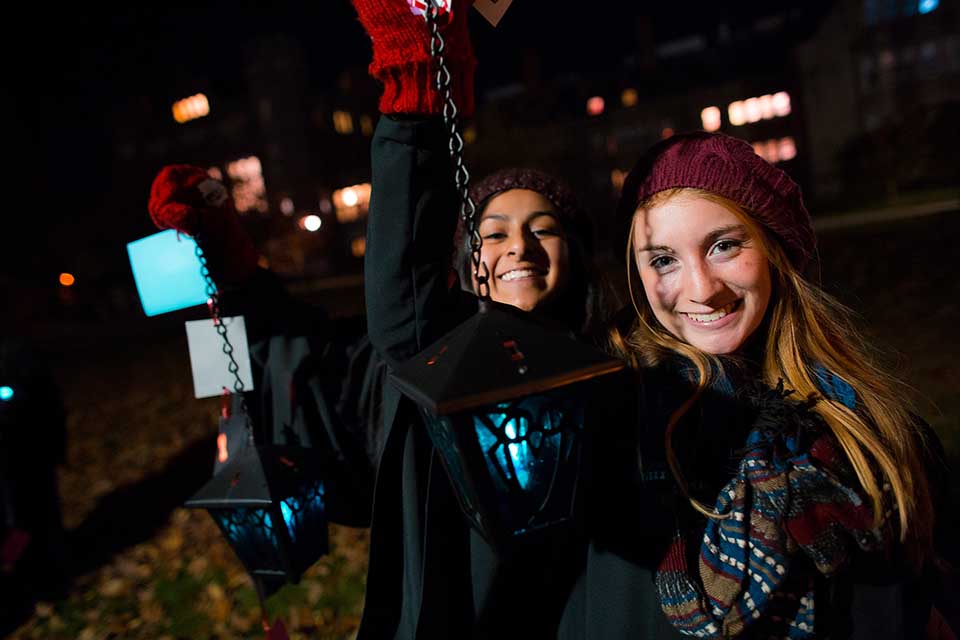Meet the two Bryn Mawr students who organize all of the college’s traditions
By Kelsey Rall
On any other brisk Sunday evening, Bryn Mawr students would have been napping in their rooms, finishing last-minute assignments in the library, or hanging out in the Campus Center. On this particular night, however, Mawrters as well as alumni and guests crowded into the darkening Cloisters of the M. Carey Thomas building to watch the time-honored Bryn Mawr tradition of Lantern Night. At the head of this huge event were two dedicated students: Pam Gassman and Dijia Chen.
The 2014-15 Traditions Mistresses, Gassman, 20, and Chen, also 20, were in charge of organizing and running this decades-old tradition, as well as three of the Bryn Mawr’s other traditional events, which are Parade Night, Hell Week, and May Day. According to Gassman, they were responsible for planning the four major traditions at Bryn Mawr, having weekly meetings, reserving rooms, sending tradition-related emails, and attending SGA [Self Governance Association] as members of the representative council, as well as performing “physical labor—songbooks [for traditions with organized singing] are heavy.”
Lantern Night, the second of Bryn Mawr’s four major traditions, required a ton of organization from the two Traditions Mistresses. During this event, first-year students received lanterns in their class color, which was meant to represent that “the light of knowledge…being passed from one class to the other” according to the traditions page on Bryn Mawr’s website. The event was one of Gassman’s favorites because she “likes cult-y things.”
In an interview prior to the event, Gassman, a slight brunette with piercing blue eyes, spoke with confidence and unwavering eye contact. Her quieter partner, Chen, often stared at her fidgeting hands while she talked, which was infrequent. While Gassman often began speaking with self-assuredness, she would pause to reassess her words midsentence. Chen, on the other hand, chose her words carefully and sparingly.
Traditions Mistress, an elected role, was voted on by the student body in the spring. Classically, the role is held by two juniors. Of the job, Chen said, “I think you really have to want to do it to be able to do it.” Gassman agreed and added, “There’s so much coordination, and I think Dijia and I are both mellow…and we can take a step back and see things from different perspectives, which really helps.”
Gassman and Chen met on the Hell Week Committee, a group designed to plan and coordinate Hell Week, another of Bryn Mawr’s traditions. The current juniors decided to run together because their experience on the Hell Week Committee proved they worked well together. Gassman said, “Definitely being together on the Hell Week Committee and working together…gave us the background we needed to know that we could work together well, and have…a professional relationship together.”
Of their partnership, Gassman said, “We knew how we were going to divide certain roles, like I’m the loud one.” Chen added, “She’ll be the person leading the sheep with a blowhorn in front, and I’ll be the person in the back, herding the sheep.”
As Lantern Night drew closer, the two were responsible for sending dozens of emails, ordering hundreds of lanterns, and managing several student volunteers, among many other tasks. True to their aforementioned “roles,” Gassman took charge of the louder jobs, while Chen expertly organized in quiet.
During the frosty Sunday night, Gassman and her confident voice wrangled the first-year students into organized lines. Chen, on the other hand, slipped from place to place, fixing problems and checking in on student volunteers. Gassman held a megaphone, and Chen carried a walkie-talkie.
While Lantern Night was a success, running an entire college’s traditions was not always an easy task. “There’s a lot of different ideas, and just managing that and how to involve traditions” was a challenge, said Gassman. She also said, “Social media can be hard,” as many students who disagreed with changes to traditions flocked to the Internet to voice their concerns.
Chen added, “It really is impossible to satisfy every single person,” but “no matter what kind of experience you’ve had, if we change it a little bit, it doesn’t invalidate your experience.” She was referring to the change in the first tradition, Parade Night. Where upperclassmen used to through water at first-years, now they throw confetti and blow bubbles. Many students and alums were outraged by this decision and complained to Gassman and Chen. Though the constant criticism from the student community was challenging, Gassman said, “I [knew] what I signed up for…you have to have resolve.”
While the pair dealt with some difficult situations and stressful jobs, they mentioned that the gratitude of students made it all worth the hard work. Gassman said, “It’s really the small little words of ‘thank you for making this experience’” that were the best part of the job.
After the hundreds of participants in Lantern Night left, and the Thomas Cloisters were once again quiet, Chen wandered around, picking up pieces of trash and putting everything back in order. A small group of students gathered in the quiet Cloisters, and upon seeing Chen, they loudly and enthusiastically applauded her hard work and dedication. According to Chen, “little things” like this “made the job worthwhile.”

